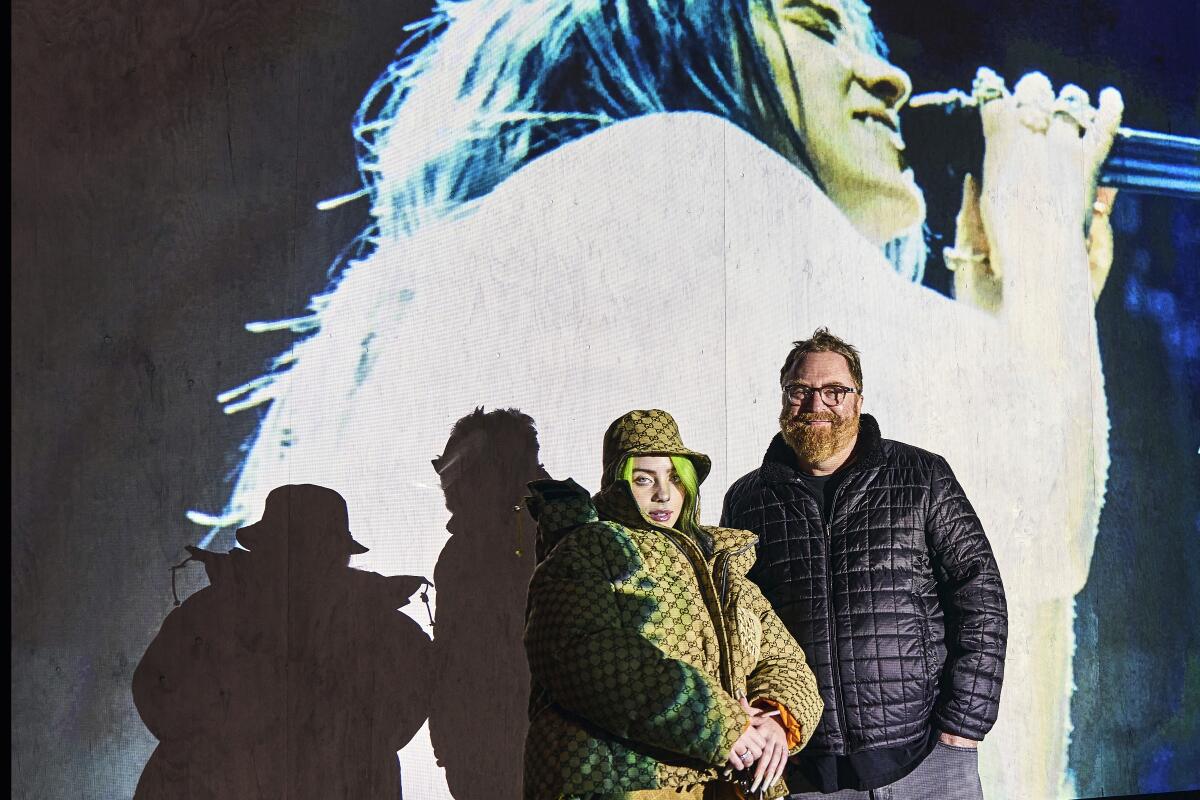Trust with his subject takes R.J. Cutler’s Billie Eilish film to a new level of intimacy

Documentaries about pop musicians are such a staple of streaming television that they often appear interchangeable. But producer-director R.J. Cutler went back to the source to inspire his Apple TV+ project “Billie Eilish: The World’s a Little Blurry.”
The two-hour, 20-minute film, which premiered in February, tracks the teenage Eilish and her older brother Finneas as they write and record her debut album in a now-famous cramped bedroom studio. The camera follows closely as Eilish performs a string of concerts and eventually triumphs at the Grammy Awards amid all the stress and insecurities of adolescence, amplified by eruptive stardom.
For the record:
2:25 p.m. June 16, 2021An earlier version of this post gave the last name of Eilish’s father as Finnegan. He is Patrick O’Connell.
The observational style and protean subject evoke the original rock doc, D.A. Pennebaker’s “Dont Look Back.” The cinéma vérité landmark captured with acute intimacy a mercurial Bob Dylan — then only a few years older than Eilish is now — as he invented himself on a 1965 U.K. tour.
“I realized the very first time I sat with Billie that the film represented an opportunity not only to tell the story of a young artist coming of age but also a young woman coming of age,” Cutler recalled. “It was very clear, and that’s what put me in mind of ‘Dont Look Back.’”
That perspective gives the project its thematic tension. “Each is a metaphor for the other,” Cutler said. “The coming of age as an artist involves all the things that are involved in figuring out who you are … what you want to say, what you want to stand for, who you want to be and vice versa.” The film also includes Eilish’s parents, Maggie Baird and Patrick O’Connell, at once clinging to a child on the cusp of adulthood and encouraging her independence. One of the director’s favorite moments in the film is when Billie roars off in a matte black Dodge Challenger, the dream car she received as an 18th birthday gift.
“Only a few minutes earlier, Maggie is in the kitchen talking about Billie’s career and she makes this gesture” — Cutler pushes his hand skywards on the Zoom screen — and then a few minutes later Patrick is in the backyard … and he makes the same gesture as he talks about her going to find her future. In a way, it’s the same thing … and it’s powerful stuff.”
Cutler, who looked to the Maysles brothers’ epochal Rolling Stones documentary, “Gimme Shelter,” for how the backstage and concert footage was shot, had one advantage over his filmmaking heroes. “Dylan didn’t have a phone with footage on it,” he said. “Billie Eilish does.” What Cutler calls “neo-vérité” scenes from Baird’s and Eilish’s cellphones expanded his options in storytelling.
The film is one of multiple projects the always busy Cutler has up for Emmy Awards consideration. He directed the 2020 documentary “Belushi” (on Showtime), reconstructing the life of the tragic comedian, and created the docuseries “Dear …” on Apple TV+, in which celebrities such as Spike Lee, Oprah Winfrey and Misty Copeland read letters from individuals who have been inspired by their work.
The Emmy and Peabody award-winner has been prolific since launching his film career in 1992 as a producer of Academy Award nominee “The War Room,” D.A. Pennebaker and Chris Hegedus’ now-classic documentary about Bill Clinton’s first presidential campaign. He’s ventured into fictional narrative as well as an executive producer of the series “Nashville” and director of the fantasy drama “If I Stay.” Looming endeavors include a Netflix documentary on Martha Stewart.
The common thread, Cutler explained, is his attraction to “people who are achieving at a very high level and who care a lot about their work and are doing it under really high-stakes circumstances.”
Such stakes feel nervously elevated in the O’Connell household, where Cutler and his minimal crew did their best to “be as skinny as possible” while nurturing a secure bond with their subjects. “There’s a higher level of vulnerability, and for Billie, people are encountering something they’ve never encountered before in terms of this exploding success,” Cutler said. “The fact they can trust you becomes of great value to them as well.”
Even as Eilish is poised for liftoff, Cutler most often frames the extraordinary songwriter and performer in the everyday setting of four walls and family — and occasional encounters with childhood heartthrob Justin Bieber, among Eilish’s other superstar fans. For Cutler, that all goes back to vérité.
“One of the fundamental convictions of the artists who were involved in that movement — the Maysles brothers, Pennebaker, Robert Drew, Ricky Leacock and then Barbara Kopple and the next generation — what they believed was that you didn’t have to be Robert Redford to be a movie star,” Cutler said. “You could be Mick Jagger, or you could be some coal miners on strike in Harlan County, Ky., or you could be a couple of Bible salesmen, or you could be some distant cousins to the first lady of the United States of America. And all of those people, if they were filmed in this style, in this approach, with this trust, all of these peoples’ stories could carry the big screen.”
More to Read
From the Oscars to the Emmys.
Get the Envelope newsletter for exclusive awards season coverage, behind-the-scenes stories from the Envelope podcast and columnist Glenn Whipp’s must-read analysis.
You may occasionally receive promotional content from the Los Angeles Times.










